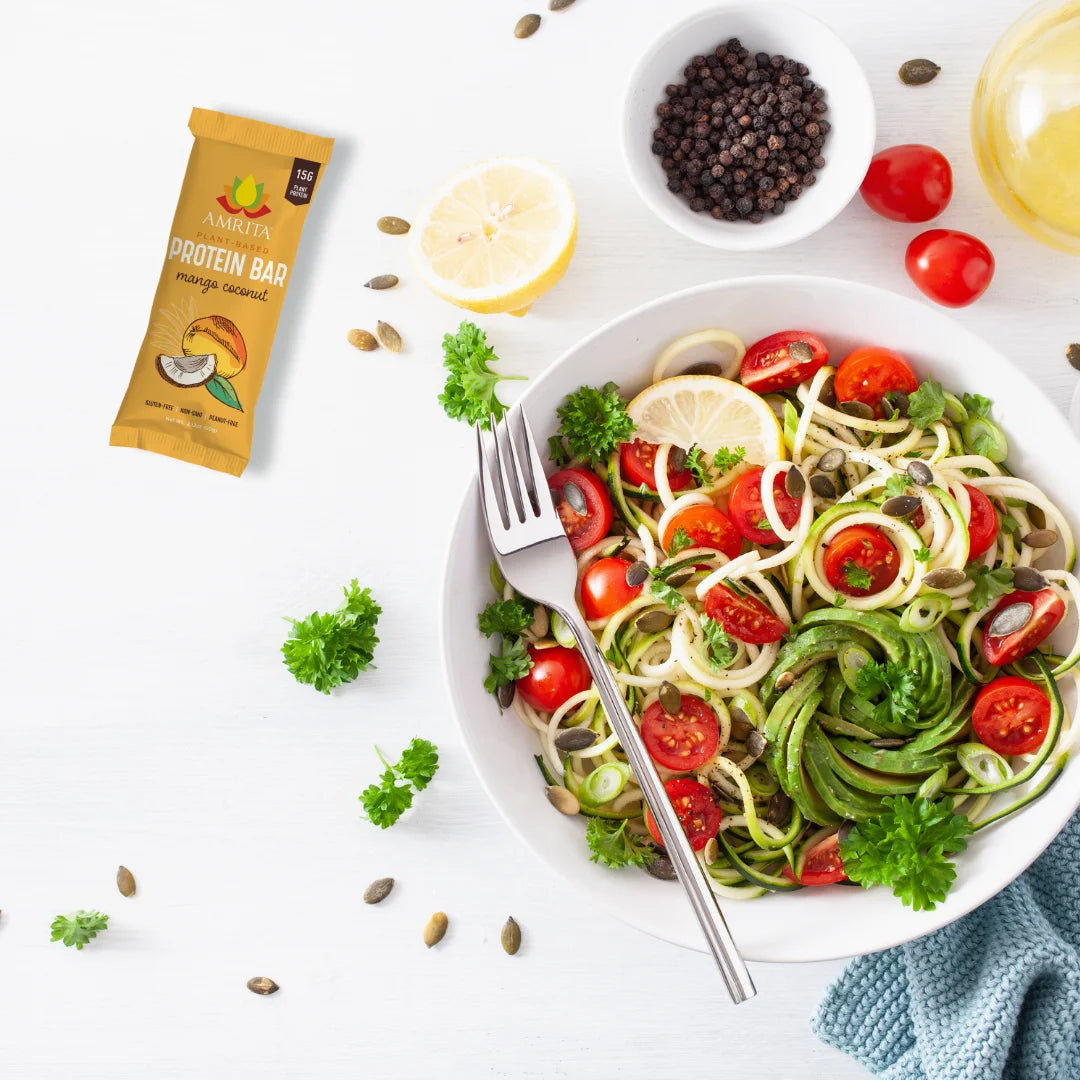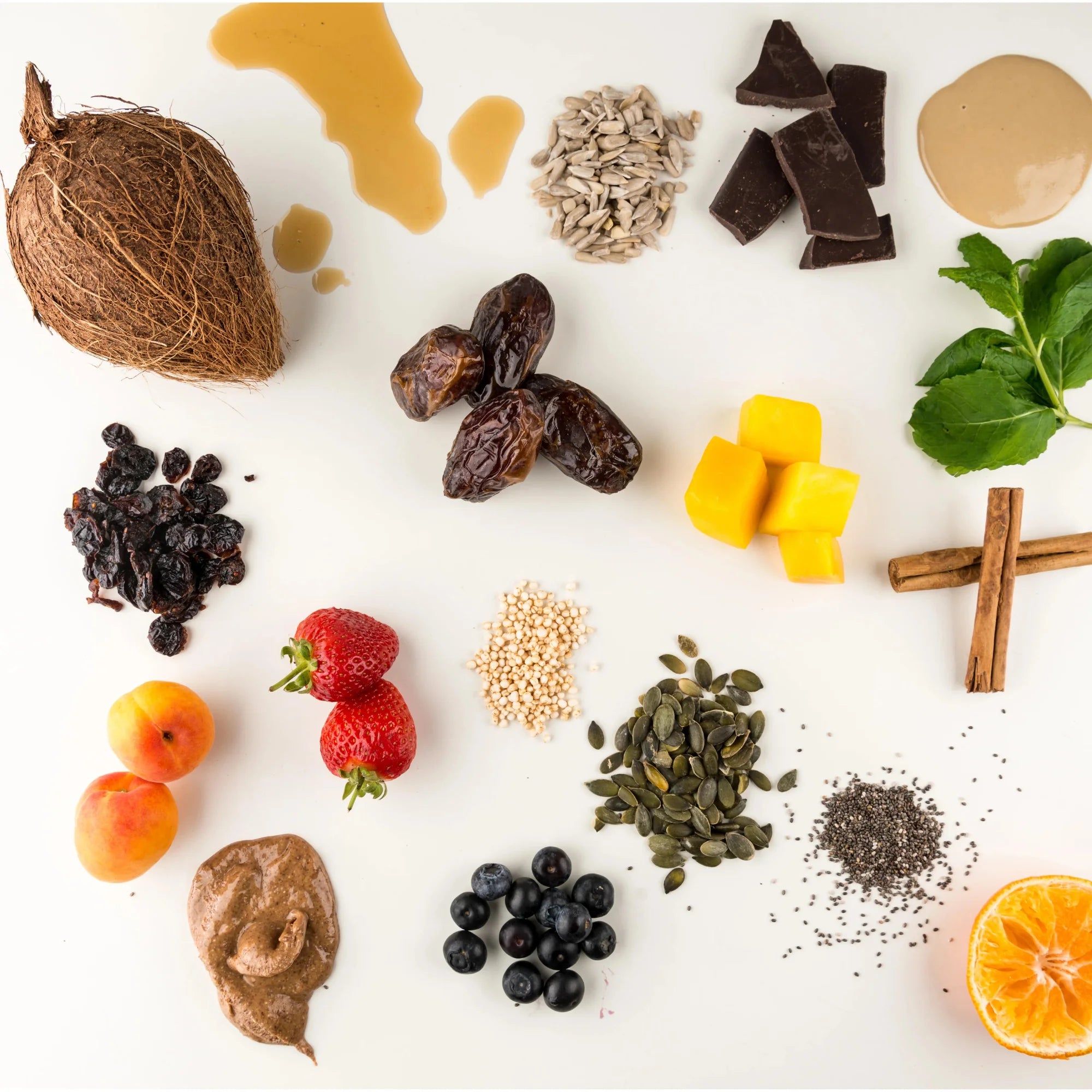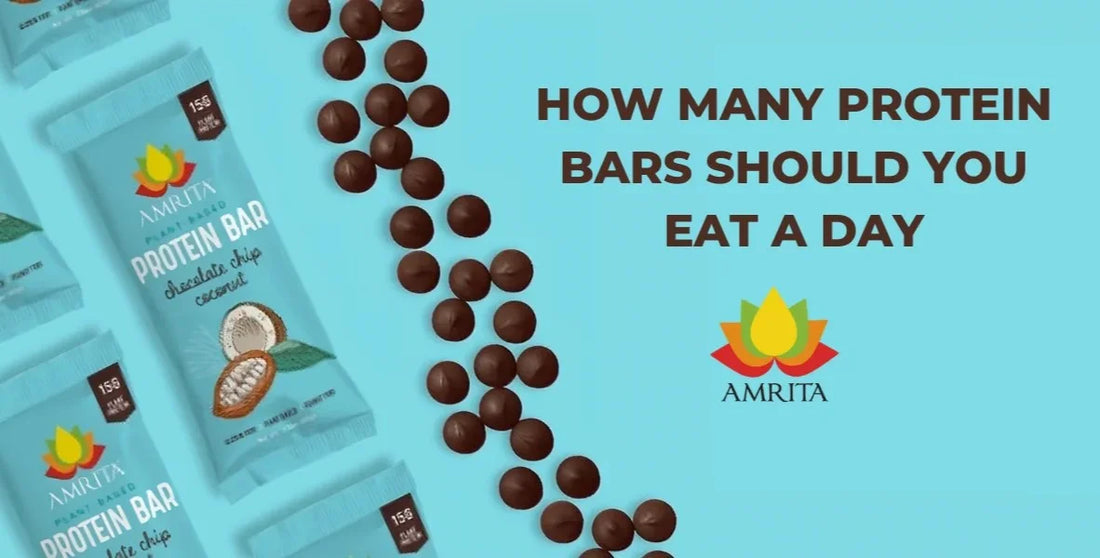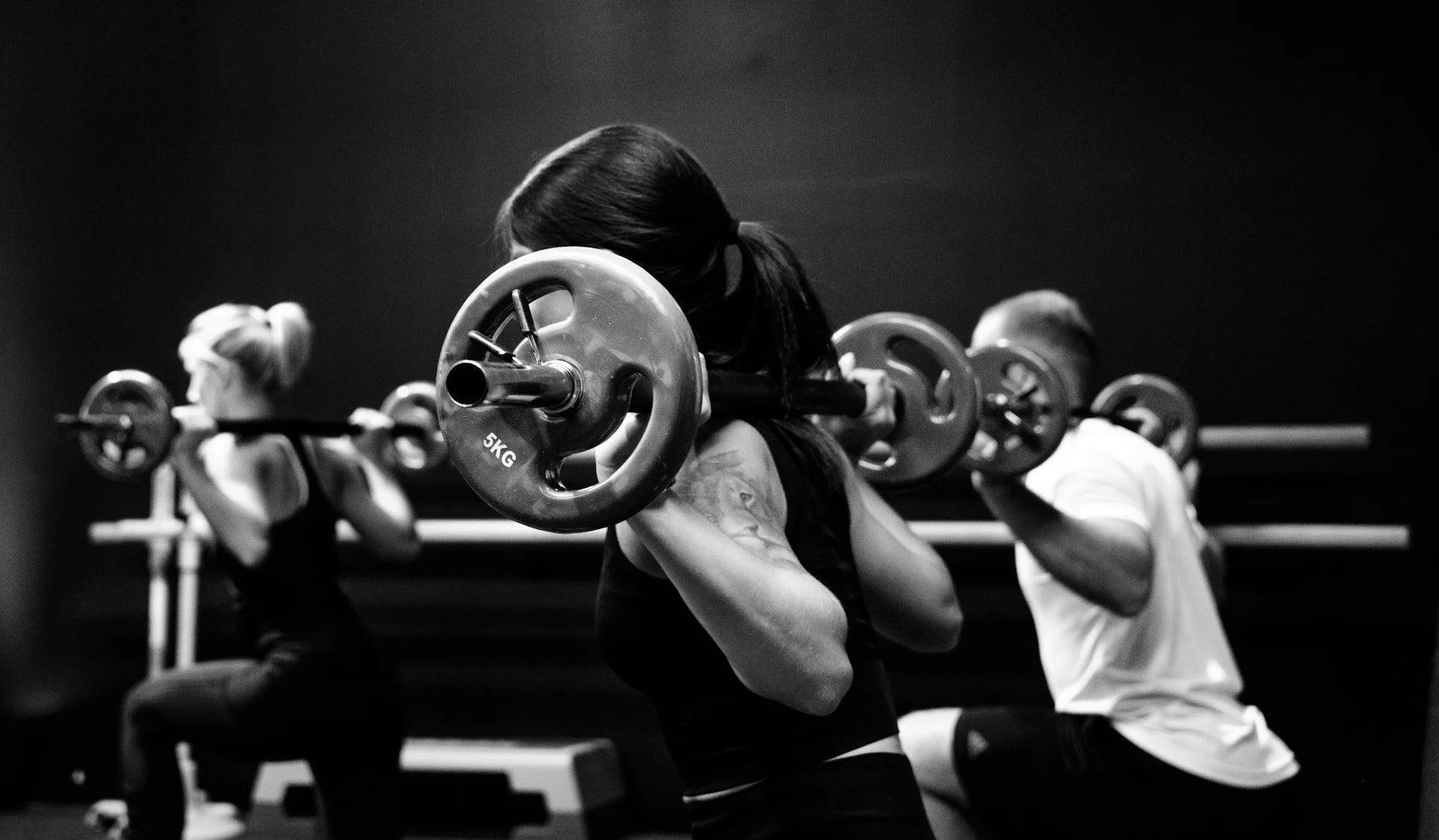How Many Protein Bars Should You Eat a Day?
Protein bars are loved and enjoyed by many in the fitness industry and are a popular snack. This is mostly because they’re healthy and taste amazing, which makes you want to eat as many of them.
But the question arises: how many protein bars a day is considered healthy for everyday consumption?
In this guide, we’ll cover how many protein bars you should eat per day, what happens if you eat too many protein bars, and how to choose the healthiest protein bar out there.
Protein Bar Nutrition
Protein bars have high nutritional value, but not all of them are created equal.
Some brands focus on clean protein bars and use only natural ingredients.
Here’s a breakdown of the top 3 protein bar brands out there:
| 1 serving | Protein | Dietary Fiber | Total Sugar | Calories |
| Clif Bar | 10g | 5g | 17g | 250 |
| RXBAR | 12g | 5g | 13g | 210 |
| Amrita Health Foods | 15g | 7g | 9g | 240 |
How Many Protein Bars Should You Eat a Day?
One or two protein bars per day is the recommended limit for most individuals.
Generally speaking, there is no need to have more than 1-2 protein bars a day. Protein bars are not meal replacements and shouldn’t be used instead of healthy, balanced meals.
So, if you’re trying to get more protein, you’ll benefit more from getting it from natural, lean protein sources through your meals.
What Happens If You Consume Too Many Protein Bars?
If you really love protein bars and often fall into the snacking temptation, you should first consider all the health risks that come with consuming too many protein bars.
Most protein bar brands out there use artificial ingredients and added sugars, which can pose multiple health risks. However, the main problem here is protein, which can strain the kidneys and liver and lead to many other issues if not consumed within limits.
Some of the risks that come with eating too many protein bars are:
Digestive Issues:
Most protein bars contain sugar alcohol and high amounts of fiber, which can cause bloating, gas, and stomach discomfort. Some may even experience abdominal cramps or pain due to the ingredients found in protein bars.
That’s why it’s crucial to choose a protein bar brand that uses only natural and healthy ingredients in their protein bars and keep your gut healthy .
Unhealthy Weight Gain:
While protein bars are a healthy and filling snack, they’re not a meal replacement and can lead to unhealthy weight gain.
It might not feel like it, but protein bars are calorie-dense, and you have to count them up into your diet.
Otherwise, what seems like a tiny snack can have a huge impact on your weight.
It’s important to keep track of how many protein bars you’ve consumed and the caloric value they carry.
Nutrient Imbalance:
Protein bars only consist of certain nutrients your body needs, other ingredients you have to find in meals.
Overeating protein bars means your body is getting enough calories to function, but not enough vitamins and minerals for optimal health.
In fact, protein bars can easily fill your stomach up and satisfy your appetite, and if you don’t consume the necessary vitamins, minerals, and nutrients that protein bars don’t carry, your body will miss important nutrients necessary for optimal health.
This is why consuming protein bars and keeping a balanced diet is crucial for healthy bodily function.
Benefits of Protein Bars
Muscle Growth
While training, you tear muscle fibers, which causes them to repair and grow stronger.
Protein is the key factor that is responsible for muscle growth and recovery. The high protein content in protein bars gives your body all the essential amino acids it needs to fully recover from workouts.
That’s why you’ll see most bodybuilders consume protein powder, protein bars, and other protein-filled products, like protein oats.
Weight Loss
While protein bars are calorie-dense, they usually have fewer calories than everyday snacks, which makes them a healthier option for people who are on the journey to lose weight.
The high protein content can also satisfy your hunger and make you feel full faster, which will prevent snacking later in the day.
Consuming them in the morning is also a great way to start the day while boosting your metabolism and keeping your stomach satisfied for the next couple of hours.
Healthy Snack
One of the main reasons protein bars are popular is not only because they’re healthy but also convenient.
You’re in a rush and a bit hungry? Protein bars are a great on-the-go snack that doesn’t take any time to cook or prepare.
Instead of snacking on traditional snacks, like chips, cookies, or crackers, take a healthy protein bar and give your body the nutrients it needs.
Unlike many typical snacks that contribute to energy spikes and crashes, protein bars have a balanced blend of protein, carbohydrates, and fats that provide sustained energy throughout the day.

What Is The Best Time To Eat Protein Bars?
Generally speaking, protein bars are best eaten as a snack after a workout session or as an energy boost for long cardio workouts, like hikes or runs.
Eating a protein bar within 30 minutes of exercising helps your body repair muscles and recover from the workout.
However, this doesn’t mean you can’t eat them at different times of the day. In fact, the timing can also impact some of the benefits you experience from protein bars.
Pre-Workout Energy Boost
Having a protein bar 30-60 minutes before your exercise can provide your body with energy and nutrients, which leads to better workout performance and endurance.
So, if you want to give your stamina, performance, and endurance a boost, give protein bars a try before working out.
Before Bed
If you regularly experience cravings during the night or before bed, a protein bar can be a great solution to that.
A protein bar will serve your body as a source of protein and nutrients during the overnight fasting period, which decreases the chances of you waking up and craving a snack.
How To Choose A Healthy Protein Bar
When choosing a protein bar, it’s important to pick something healthy and delicious.
Here are some guidelines to help you pick a protein bar:
Made with Natural Ingredients
Look for protein bars that contain whole foods like seeds, and dried fruits . Avoid bars with artificial additives, preservatives, and high-fructose corn syrup.
This way, you’ll only be eating whole, healthy ingredients.
Take Amrita’s vegan protein bars for example, we only use certain ingredients like fruits, chia seeds, sunflower seeds , and rice or pea protein in our protein bars.
All natural, healthy ingredients. Nothing artificial!

Less Added Sugar
Before buying a protein bar, check the sugar content.
Most protein bar brands go overboard with added sugar because they want to add taste to their bars.
Look for brands that are sweetened with natural sweeteners like honey or maple syrup, which don’t lead to energy crashes or unnecessary weight gain as added sugar does.
High in Protein
One of the main reasons you’re buying a protein bar is because of the name, protein.
Look for bars that are high in protein, ideally containing at least 10 grams of protein per serving. Protein will help with muscle growth, repair, and overall bodily function.
Some protein bars are higher than others in protein content. The top-tier ones usually contain 15g or more of protein per serving
Low in Calories
If you’re on a journey to lose weight, you should consider protein bars that have a high amount of protein and a low amount of calories.
It’s crucial to find a bar that properly balances nutrients and calories. Make sure you read the label carefully and consider if the protein and nutrient content is worth the calories.
Why Plant-Based Protein Bars are Better Than Whey Protein Bars
Plant-based protein bars have been gaining popularity for many reasons that make them a better alternative to whey protein bars.
Here are some of the reasons you should consider plant-based protein bars over whey protein bars.
Easier Digestion
Vegan protein bars are easier to digest compared to whey protein bars. Whey protein, being a dairy product, can be difficult to digest for some people and can lead to bloating or gastrointestinal discomfort.
Plant-based protein bars are usually derived from sources like peas, brown rice, or hemp, and are gentler on the stomach and less likely to cause any digestive issues.
Fewer Allergens
Whey protein bars are derived from milk and can be problematic to those with dairy allergies or lactose intolerance.
Vegan protein bars are a safer alternative, free from common allergens like dairy, soy, and gluten.
Amrita’s protein bars are made with a focus on allergies and are free from the 14 most common allergens. Impressive, right?
Hormones and Antibiotics
Whey protein, sourced from dairy farms, may contain hormones and antibiotics used in cattle.
Plant-based protein bars are free from those additives and are a cleaner protein source, making them a better alternative if you want to avoid potential risks associated with added hormones or antibiotics.
More Nutrients
Plant-based protein bars often have plenty of nutrients that are not found in whey protein bars, like nuts, seeds , fruits, and other healthy superfoods that give your body the essential vitamins, minerals, and antioxidants.
Conclusion
Protein bars are a great, healthy, and convenient snack for those looking to consume more protein. However, it’s important to pair them with a balanced diet and an active lifestyle to maximize the benefits of protein bars.




